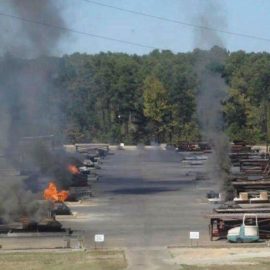
The cost of industry. An ammonia leak in Donaldsonville has closed a school.
An ammonia gas leak at the CF Industries complex in Ascension Parish led Thursday morning to the evacuation of all students and staff at Donaldsonville Primary School and shut the two primary entrance highways to the city from the southeast, local officials said. Out of an abundance of caution, school officials said, the students and staff have been moved to the Lowery Elementary/Middle campus a few miles way on La. 1 in Donaldsonville. Donaldsonville Primary is located along La. 3089 and is within sight of the CF Industries, the largest fertilizer complex in North America that uses ammonia as a central element in its production processes. A sugar cane field separates the Mississippi River plant from the school of around 460 children.
nola.com
Roads have been closed and a HAZMAT team has been called.
River Road and La. 3089 have been closed going upriver and the Ascension sheriff’s office hazardous materials teams have been called to the scene, the Ascension Parish sheriff said. Residents trying to reach Donaldsonville from downriver and from the southeast must detour down La. 70 and La. 308 in the Paincourtville area to reach the riverside city from the south. In a statement, CF Industries officials said the leak occurred about 6:30 a.m. in an ammonia storage loading area inside the plant complex, which is just outside the city of Donaldsonville. “Containment work is ongoing at the site with monitoring in place,” CF Industries officials said in a statement. No injuries have been reported, CF Industries said.
Ammonia is not a good thing to take in.
Though a chemical found naturally in the environment, including in soil, ammonia is also a common industrial chemical that at significantly high concentrations can be caustic gas that will irritate and even seriously damage the eyes, nose, throat and lungs. A flange on an ammonia storage tank failed, said Greg Langley, spokesman for the state Department of Environmental Quality. Since then the leak was detected, emergency crews have been spraying water on the flange to try to prevent the ammonia gas from continuing to spread. The gas, which is generally lighter than air, is soluble in water. Once it is hit with the water spray, it is washed on to the ground, Langley said. Langley added the crews were waiting shortly before 9 a.m. for the leaking flange to depressurize so they can start repairs. Langley couldn’t say how much ammonia was in the storage tank before the leak began. CF Industries officials said no other community locations, which are generally farther from the plant than the school, have been asked to shelter in place.
Low levels of ammonia were found at the fence of the plant.
DEQ responders did initially detect low levels of ammonia at the plant’s fence line, Langley added. The readings at the fence line are a possible indication that some ammonia was getting off site, at least initially, but Langley said those early readings weren’t high enough to represent a threat to the public. He didn’t have precise figures, however. In addition to the public school, the huge plant is also near a busy commercial area along La. 3089 with a large Walmart, fast-food restaurants and other shops and is also near one of the city’s oldest neighborhoods closer toward the Mississippi River. Sheriff Bobby Webre said the readings inside the community weren’t at levels that posed a risk to public, either. Donaldsonville Primary students and staff will stay at Lowery until the all-clear is given, school officials said in a Facebook post Thursday morning.
The plant in Donaldsonville makes more ammonia than any other plant in the world.
CF Industries near Donaldsonville, on average, produces 4.34 million tons of ammonia per year, the company says, making it the largest in the world for ammonia production. CF Industries create the ammonia by synthesizing hydrogen pulled from natural gas and nitrogen from the air. The ammonia is used to create the agricultural fertilizer products nitric acid, urea and urea ammonium nitrate, the company says. This is a developing story, check back for updates.
Leaks occur in anything handling liquids or gases.



